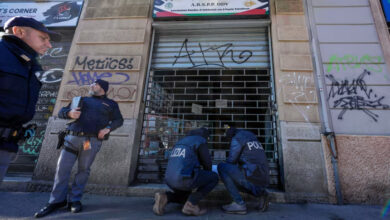
ROME (Reuters) – Italian prosecutors said on Thursday they planned to charge four senior members of Egypt’s security services over their alleged role in the disappearance and murder of student Giulio Regeni in Cairo in 2016.
In a statement, the prosecutors said all four were suspected of taking part in the “aggravated kidnapping” of Regeni. It said one of them, a major in Egypt’s general intelligence, also faced charges of “conspiracy to commit aggravated murder”.
The prosecutors gave the four men 20 days to respond to the charges after which, they said, they would ask a judge to indict them.
“We have acquired unequivocal and significant evidence,” Rome chief prosecutor Michele Prestipino told a news conference, adding that he did not expect to see justice served in Egypt.
“For Giulio’s murder there is just going to be one trial, and it will be held in Italy,” he said.
Under Italian law, suspects can be tried in absentia.
There was no immediate comment from Egyptian authorities. Egyptian officials have repeatedly denied any involvement in his killing.
The suspects were named by the prosecutors as Major Sherif Magdy, from General Intelligence; Major General Tarek Sabir, the former head of state security; police Colonel Hisham Helmy; and Colonel Ather Kamal, a former head of investigations in the Cairo municipality.
Regeni, a 28-year-old postgraduate student at Cambridge University, vanished in Cairo in January 2016. His body was found almost a week later and a post mortem examination showed he had been tortured before his death.
Regeni had been researching Egypt’s independent unions for his doctoral thesis. Associates say he was also interested in alternatives to the long-standing domination of Egypt’s economy by the state and military. Both subjects are sensitive in Egypt.
The prosecutors’ move came just over a week after Egypt announced that it was temporarily suspending its investigation into the murder of Regeni, saying it had reservations about the evidence Italy had compiled.
SOURED RELATIONS
Italian and Egyptian investigators had been working together to try to solve the crime. But Italian judicial sources told Reuters last year that Italy was frustrated by the slow pace of developments in Cairo and decided to press ahead with its own line of inquiry in an effort to move things forward.
Italy originally placed five Egyptians under investigation in the case. Four of them are named in Thursday’s prosecutors’ statement, while it said there was insufficient evidence to proceed against the fifth person.
Regeni disappeared on the fifth anniversary of the start of the 2011 uprising that ended the 30-year rule of Hosni Mubarak.
Intelligence and security sources told Reuters in 2016 that police had arrested Regeni outside a Cairo metro station and then transferred him to a compound run by Homeland Security.
The police denied this and in a statement on November 30, Egypt’s public prosecution said it had evidence against a criminal gang accused of robbing Regeni but believed that “the material perpetrator” of the murder remains unknown.
Regeni’s death soured relations between the two countries and Italy initially withdrew its ambassador from Cairo in protest. Rome subsequently restored its top envoy and there has been no let-up in trade relations.
According to data provided by parliament, Italy authorized arms sales worth 871.7 million euros ($1.05 billion) to Egypt last year – almost twice as much as the second-placed country on the list.
It also looks poised to approve the sales of two frigates in a deal that could be worth as much as 1.2 billion euros, industrial sources say. ($1 = 0.8275 euros)
Reporting by Crispian Balmer and Domenico Lusi Editing by Gavin Jones and Mark Heinrich




